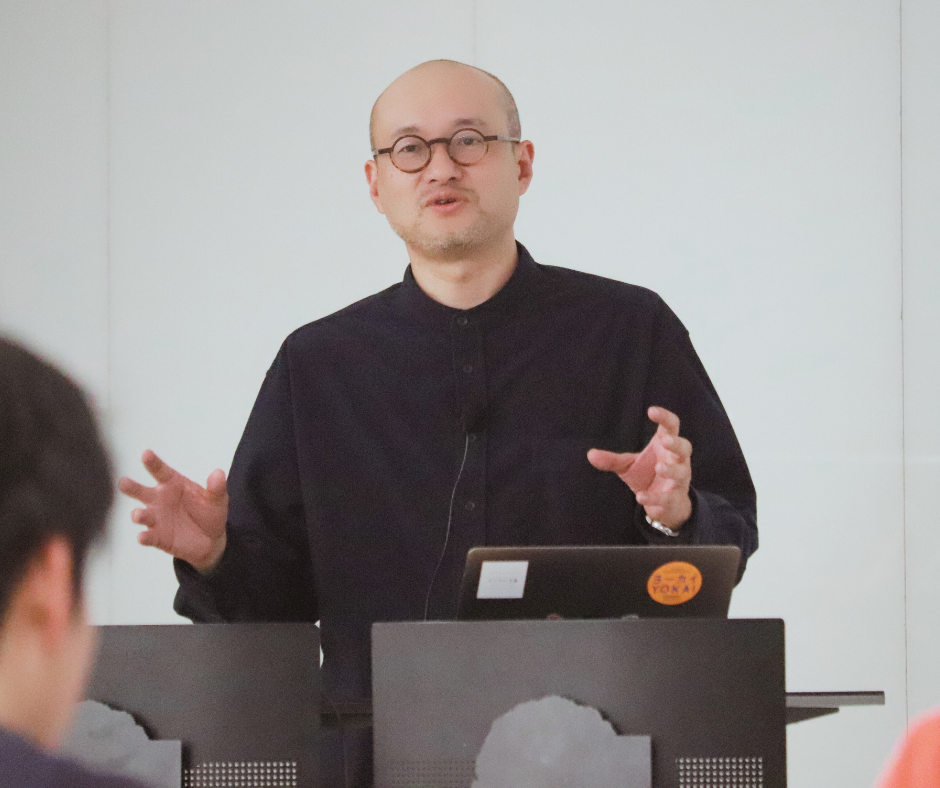
On Thursday, November 6, 2025, the 1st Medical Impact Night was held at the Nihonbashi Campus of Shizenkan University.
This new initiative, launched by the university’s Impact Economy Center, expands upon Shizenkan’s signature “Impact Night” series. The event aims to bring together individuals passionate about tackling social issues in healthcare, nursing, and welfare, creating a forum for dialogue and collaboration toward a better future.
Learning from a Shizenkan Alumnus — A Platform for Connection and Insight
The evening opened with remarks by Dr. Kenichiro Konno, a Shizenkan graduate (Class of 2025), founder and physician CEO of Carus Holdings. Drawing from his experience as a doctor and social entrepreneur revitalizing community healthcare, Dr. Konno introduced Shizenkan as a graduate school that goes far beyond conventional management education.
He emphasized that Shizenkan nurtures holistic leadership by engaging students with fundamental questions such as “Where do we come from?”, “Who are we?”, and “Where are we going?” Dr. Konno also expressed his hope that Medical Impact Night would serve as a space where participants from diverse fields connect across disciplines, gain new perspectives and inspiration.
Keynote Lecture by Dr. Son Daisuke: “From Social Prescriptions to Cultural Prescriptions”
The featured speaker, Dr. Son Daisuke, Associate Professor at the Department of Community Medicine, Tottori University School of Medicine, delivered an engaging lecture titled “From Social Prescriptions to Cultural Prescriptions.”
Motivated by challenges encountered in clinical practice, Dr. Son has developed a wide range of community-based initiatives that bridge medicine, art, and culture.
Highlights of Dr. Son’s activities:
- From hospitals to the community:
He introduced projects such as Minkuru Café, where citizens and healthcare professionals engage in open conversations at local cafés, and the Yanesen Community Health Project, which promotes residents’ wellbeing by leveraging local resources.
In another initiative, doctors and nurses take a mobile coffee cart into the streets to serve coffee and casually interact with residents—creating opportunities for gentle dialogue even with those less interested in health topics. These activities have helped foster wellbeing and trust within the community. - Cultural prescriptions through filmmaking:
As a director and screenwriter, Dr. Son has produced films such as Uchige de Ikitai (I Want to Die at Home), which explores home-based end-of-life care.
He holds screenings and workshops across Japan, encouraging participants to reflect on life, death, and community healthcare through shared dialogue. - Practicing Health Humanities:
Dr. Son also promotes Health Humanities—an approach integrating literature, philosophy, and art into medical education and practice.
He highlighted the importance of cultivating negative capability—the ability to stay with difficult, unanswerable questions—as an essential quality for healthcare professionals.
Dr. Son emphasized that medicine should go beyond prescribing drugs or providing treatment; it should also nurture human connection, creativity, and cultural engagement as integral aspects of wellbeing.
He spoke about the significance of “loose connections” and “places to gather” (tamariba) as forms of social capital that profoundly influence mental and physical health. Through art and dialogue, he continues to explore what truly human-centered healthcare might look like.
Dialogue and Reflections for the Future
After the lecture, participants divided into small groups to share reflections and ideas, leading to lively discussions. During the Q&A session, participants raised thought-provoking questions such as “How can these initiatives be made sustainable?” and “How will the role of healthcare professionals evolve in the age of AI?”
In response, Dr. Son explained that sustainability may take many forms through partnerships with local governments, business models, or other collaborations—but emphasized that the true value lies in the personal transformations of those involved and in the relationships built within communities through these activities.
The event concluded with closing remarks from Prof. Masataka Uo, Vice President of Shizenkan University and Director of the Impact Economy Center.
He described Dr. Son’s initiatives as a kind of “social R&D”—research and development that transcends existing frameworks to generate new value. “Practitioners who step outside conventional systems and prototype new social structures,” he noted, “serve as essential role models for shaping the future.”
He also emphasized the importance of cross-sector collaboration in creating innovative solutions to complex social challenges.
Following the formal program, participants and speakers enjoyed an informal networking session over drinks, engaging in warm conversation and deepening their connections.
The Medical Impact Night series will continue to be held regularly.
The next session is scheduled for January 23, 2026, featuring Dr. Yoshihiro Takayama, an expert in infectious disease control and community healthcare.
